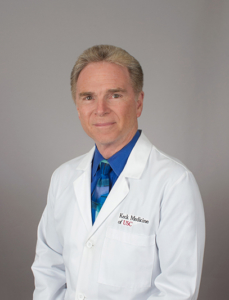
Steven Giannotta
For a small department, the Department of Neurological Surgery at the Keck School of Medicine of USC seems to have an oversized profile, at least when it comes to securing funding for its young clinician-scientists. Several recent faculty members to join the department have received career development funds, also known as K awards, from the National Institutes of Health (NIH) for their research.
What may appear to be a stroke of good luck is the culmination of years of planning, said Steven Giannotta, MD, professor and chair of the department. Giannotta credits his predecessor, Martin Weiss, for building a team of top surgeons across several subspecialties, earning the department national recognition.
“Frankly, you must have a strong department that can attract junior faculty capable of getting a K award,” said Giannotta, noting there is stiff competition for the top talent, which requires finding creative ways to support their research.
The department leadership guarantees clinician-scientists time to devote to research. Department leaders connect the clinician-scientists with faculty outside the department, while administrators scour the budget for extra financial assistance for research and purchase equipment to show the department is serious about supporting research.
Giannotta said he also heavily relies on crucial support from the top brass at Keck Medicine of USC and the Keck School.
“It takes enlightened leadership who recognize that physician-scientists are integral to the success of our department,” Giannotta said.
Bill Mack, MD, associate professor of neurological surgery (clinical scholar), was the first junior faculty member to receive a career development award from NIH-funded Southern California Clinical and Translational Institute for his research on the role of air pollution and inflammation on stroke and brain vascular disease.
“I was encouraged to do research and got time way from the clinic to be successful,” Mack said. “My research has really advanced because I got to work with the top scientists from across this university — at the Zilkha Neurogenetic Institute, the USC Davis School of Gerontology and the USC Viterbi School of Engineering.”
The initial grant and the mentorship also helped Mack secure additional NIH funding for his research (R01) and for the residency training program (R25) that is being used to develop more talented clinician-scientists in neurosurgery.
“The goal of this whole effort is to build the complement of young researchers and it comes from the people at the top instilling a culture that values clinician-scientists and promotes faculty research,” Mack said.
By Hope Hamashige